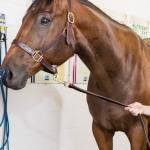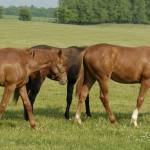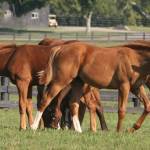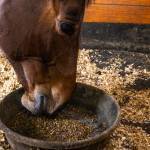Working With an Equine Nutritionist: Six Suggestions

Inviting a new professional into your horse’s circle of care can be daunting. As if marrying the right farrier, dentist, and veterinarian to your horse isn’t challenging enough, what should horse owners consider when seeking out an equine nutritionist?
1. Education
Individuals claiming to be equine nutritionists run rampant. Simply liking horses and having an interest in nutrition is not synonymous with being qualified.
“A qualified nutritionist should have at least a Master’s degree, but preferably a doctorate, in animal nutrition. Individuals specializing in equine nutrition will not only have a thorough background in what the various feeds and forages contain but also the physiology behind what the nutrients and energy from the feeds and forages do in the horse’s body,” explained Kathleen Crandell, Ph.D., a Kentucky Equine Research nutritionist.
Education doesn’t end once a degree is achieved. Search for an equine nutritionist that continues to follow trends in feeding and feeding management, especially those active in research.
2. Horse Sense
“Equine nutritionists need to be savvy, capable of talking the talk and walking the walk,” advised Crandell. “Horse owners know other horse aficionados through common lingo and knowledge. While a scientific background is essential, so is practical know-how.”
Hands-on experience with horses, not just the theoretical inner workings of their gastrointestinal tracts and physiology, is required. “Understanding the psyche of the horse is, of course, essential in trying to come up with reasonable rations in specific, individual situations,” Crandell noted. “A horse’s behavior often infuses the management suggestions I offer, so understanding how horses think and act, as best as we can, is imperative.”
3. Commitment to Patients, Not Products
A competent nutritionist will have a useful “bag of tricks,” but a great nutritionist will have many, many resources at his or her disposal. Be leery of any nutritionist that pushes one specific line of products. Not all companies offer a product for every need.
Crandell, who has long been associated with Kentucky Equine Research, admits, “If I am looking for a product that Kentucky Equine Research hasn’t studied or doesn’t manufacture, I am happy to recommend a useful product if it benefits the horse and maximizes its welfare. The horse always comes first.”
4. Teamwork
A nutritionist should fit neatly into the team of core professionals already in place, including the veterinarian, farrier, and dentist. A secondary tier of professionals may also be involved in the horse’s well-being, including a chiropractor or massage therapist.
The nutritionist should appreciate that the veterinarian and owner typically dictate the desired outcome for the horse, and the nutritionist must build the desired ration with clear instructions and details on how to achieve and maintain the outcome.
“When all of the members of a horse’s care team work together, the horse has the best chance of succeeding in health and performance,” Crandell said.
In the same vein, the nutritionist must be confident enough in his or her knowledge to voice an opinion authoritatively, offering appropriate anecdotes or past experience to illustrate the point and to help shape the horse’s nutritional well-being.
5. Respect
A successful nutritionist should respect the likes, dislikes, and preferences of the horse owner and should have profound reverence for the welfare of the horse. Some horse owners refuse to feed oil, others turn up their noses at powdered supplements. It is the nutritionist’s duty to work with the owner to suss out these preferences and come up with a plan that works for the owner and the horse.
Touching again on the idea of teamwork, the nutritionist must respect the opinions of the veterinarian as well as other professionals and work with, not against, them.
6. Perseverance
If at first you don’t succeed, try and try again. Nutritional changes often require time to take effect. Patience is required on everyone’s part, and the entire team must respect each other’s timelines in terms of strategies and outcomes.
“The initial recommendations by a nutritionist are not necessarily set in stone. What works with one horse might not work for another,” Crandell emphasized. “It is always best to be open to feedback regarding what is or isn’t working with the recommended feeding program and making adjustments from there.”








